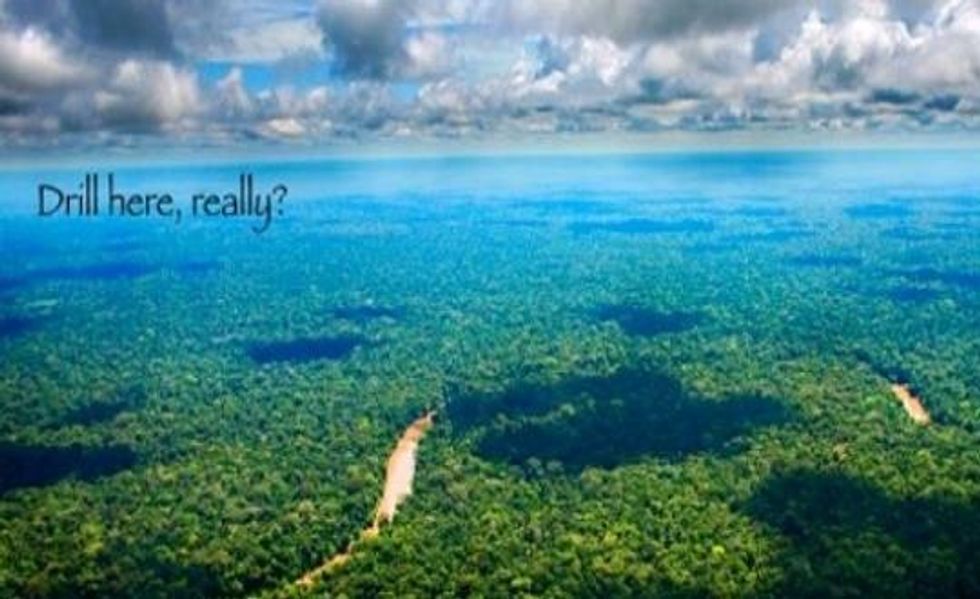If you ever wondered where the world's most biodiverse piece of land is, you might have guessed somewhere in the
Amazon Rainforest. Well, there is a particular piece of the ever- dwindling-Amazon that takes the trophy for being the worlds richest place for animal and plant diversity: Yasuni National Park, inland Ecuador. However, in this incredible place it is located the largest reserve of heavy oil of this country.
Experts within Ecuador had proposed an alternative development package, the "Yasuni ITT Initiative", which would have protected the rainforest, promoting the sustainable uses of biodiversity bases on ecotourism, agroforestry, biodiversity protection and climate change mitigation and the respect of human rights of indigenous peoples in voluntary isolation . And switched Ecuador's development path from extractivism-dependence to economic diversification and renewable energies.
The Yasuni ITT Initiative was a proposal launched by Ecuadorian Government to keep indefinitely the oil underground in an special and unique place of the Yasuni National Park, in exchange for half of the value of the reserves, or $3.6 billion over 13 years from the international community.
The Government pledged its support to the initiative, and $336 millions of dollars of foreign aid commitments were pledged from countries like Germany, Spain and Italy and also from private sector and individual contributions.
But on August 15th, the President, Rafael Correa suddenly announced that Ecuador will abandon The Yasuni ITT Initiative, due the lack of international support. This call was made despite the international support it had gained and despite there still remained a significant window of time for further investment. It's obvious that President Correa gave up on the project and got swayed by the attraction of the money from the oil. Finally, The National Assembly passed a vote (108 in favour, 25 against) to start drilling for oil in this rainforest.
This is really bad news for a large number of reasons, but here are the four key reasons:
Reason number one: Yasuni National Park is mega-diverse. Millions of years of evolution lead to this remarkable piece of rainforest becoming a refuge to an almost unbelievable richness of plants, insects, animals and trees. In fact, It is the most biologically diverse hotspot in the western, there is a similar diversity of species in one hectare of Yasuni National Park to the total of species in Canada and United States joined.
Reason number two: Drilling for more oil and burning it = climate change! Once burnt, the oil from this drilling project will produce 407 million metric tons of CO2 emissions, more than the annual emissions from France or Brazil; and cause a further 800 million metric tons of CO2 from the deforestation caused by the drilling.
Reason number three: There are two groups of indigenous peoples that are living in voluntary isolation - still in harmony with the rainforest like they have for hundreds of years; the Tagaeri and Taromenane, which belong to the Wuaorani Nationality, and who have been affected by oil drilling for decades.
Reason number four: It locks Ecuador into an extractivist development path, dependent on oil exports. The Government argues it needs to drill for oil to bring people out of poverty, but there is evidence to the contrary - that becoming too dependent on one export good, like oil, causes Dutch's disease. The high price for oil will likely drive up the Ecuadorian dollar, which has the consequence of raising the cost of living, and making it harder for manufacturing and agricultural industries to remain competitive. That's the hard lesson the Dutch learnt in the 1960s. Coupled with that is the glaring hole in the economy when the oil production ends.
There are other reasons, but these four should be enough to convince you that drilling Yasuni National Park for oil needs to be prevented. Even though The National Assembly has passed the bill to begin drilling, there is still a slim hope we can stop it. Even though that hope is slim, we have to give it our best shot.
The last two months, the sudden cancellation of the initiative has lead to a strong reaction from Ecuadorian social and environmental movements, been featured across social and news media, and has generated mobilizations and protests. This issue is starting to reach beyond just environemtalists in Ecuador - we're seeing more and more people stand up for Yasuni.




